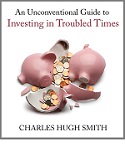

|

|
|||||||||||||
|
On Gratitude and Wealth (November 23, 2012) True wealth is what cannot be bought. We have much to be thankful for, as we hosted a Thanksgiving celebration for 23 people from eight nations at our humble home. Nationalities represented:
China
To be able to assemble such a diversity of nationalities and ethnicities is an astounding sort of wealth that remains uncommon. You can "buy" the presence of an international group of people but you cannot "buy" a gathering that arose from caring, generosity and love. Here is a partial list of the menu. I think there was one store-bought dessert someone brought; everything else was handmade and often extraordinary for reasons I explain below. There were a number of vegetarians in the group so an effort was made to provide a spectrum of non-meat dishes.
spicy mixed nuts (maple syrup, curry and rosemary)
The Dessert selections:
pumpkin pie, made with kabocha pumpkin (no cans)
It is all too easy to give a rote nod to the freedom and abundance that enable such a feast. The same can be said of the rude health needed to enjoy it. If we explore these foundations a bit deeper, we are forced to question the nature of wealth. After this gathering, I realized true wealth is mastery freely shared. If this sounds obscure, it is not intended to be so, any more than saying "wealth that seeks only to expand wealth is not true wealth." I will try to explain. We were fortunate to have two international chefs interning at Chez Panisse join our celebration, as my wife had befriended one via email before her arrival in California. Chez Panisse is unique in the world of restaurants, not for the quality of its cuisine (there are hundreds of restaurants serving up "fine dining" for a hefty price around the world) but for the immensity and reach of its influence. It is no understatement to say that it is undoubtedly the most influential restaurant in the U.S. and perhaps the world. This is the result of an integrated philosophy of using locally produced ingredients and preparing them with artful sincerity, i.e. "simply" but with authority, authenticity and with an eye on presentation. The effect is intentionally informal rather than "fancy." I will illustrate with an example from yesterday. Our flat is small, perhaps 800 square feet, and our kitchen is equivalently small. We had to combine two households (our friend/neighbor and our own) of tables, chairs and dishes to host 23 people, and we used her oven and our propane-fired burner outside to augment our overworked stove. There were already about six people crammed into the small kitchen, and the two chefs immediately found a tiny length of counter to start work. One magically located my favorite old Japanese knife (given to me by correspondent Ishabaka), and I was pleased to note she set her own knife aside to use this one. This chef quickly assembled the sort of fresh greens with accents (pomegranate seeds, etc.) that would grace the cover of Saveur, while I apologized to the other chef for asking her to do the lowly tasks of preparing the mashed potatoes and gravy. Rather than be offended by our request, she cheerfully set about making extraordinary mashed potatoes and gravy. This is true mastery: there is no small thing done badly. This is in keeping with the Chez Panisse philosophy, which aims not for some artificial heights of exclusivity but mastery of creative use of fresh ingredients in artful "simplicity." This is not well understood, I think, in a culture saturated with "celebrity chef" TV shows. No small thing done badly. In the usual "fancy meal," the mashed potatoes and gravy would be ignored or dressed up in some sort of exotica. Here, the chef kept to "simple" mashed potatoes and gravy, but did so with full mastery. As I said, our flat is small and old, and our kitchen is small and old. Despite these limitations, it is a well-stocked kitchen because we cook a lot, and the chef's ease in locating all the tools of their trade was a gratifying compliment. I watched in amazement as they seemed to already know where to find whisks, cast-iron pans, etc. in our crowded kitchen. Both loved the Manchurian Gobi (cauliflower) prepared with equal mastery by our young friends, and my wife's "Buddha's feast." Mastery is not a brand, nor is it exclusive. It is not perfection, it is the pursuit of mastery that counts. Wealth is mastery freely shared. Someone with plentiful money (paper, gold, whatever) could "buy" each dish at a restaurant or order their private chef to prepare it, but they could not "buy" such a gathering because the caring and generosity at its heart is not buyable at any price. True wealth is what cannot be bought. There are of course exceptions, but I personally do not know anyone with a showy mansion who has any real friends or who entertains out of love rather than for show. They may have a multitude of acquaintances and associates, but no real friends, for friendship cannot be bought, and the nurturing of friendship lies on a completely different path than the acquisition of "wealth." Any number of financial "gurus" constantly boast about flying between dog-and-pony shows for people with too much money who don't know what to do with their money, as if carving out a giant carbon footprint as a lapdog of the "wealthy" and squandering one's life in airports and airliners is admirable rather than merely foolish. What is presented as "wealth" is in fact a sad form of extreme poverty. Anyone with a bit of money can buy a ticket and sit in an airport. There is no trick to that. The trick is having the world come to you, and that is a "wealth" that cannot be purchased. You can "buy" servitude but you cannot buy caring, generosity or love. It is only as a participant that one can enjoy freely shared mastery. Someone with abundant money can sit down and passively consume a masterfully prepared dish, but passive consumption can never "taste" mastery, much less understand it as the pure expression of pleasure. I had difficulty sleeping, for the experience of witnessing mastery, and participating in the process, was deeply moving. Our young friends had slept over the previous night to help us prepare for the celebration, and afterward the young man told us that he had observed everyone was smiling as they ate. There is no "price" on mastery freely shared, on generosity, on caring, on companionship or on friendship and affection.
"Wealth" of the monetary kind is an illusory "wealth," a cheap chimera of meaningless
consumption, a desperate shadowplay put on for others. Wealth is mastery freely shared.
Things are falling apart--that is obvious. But why are they falling
apart? The reasons are complex and global. Our economy and society have structural
problems that cannot be solved by adding debt to debt. We are becoming poorer, not
just from financial over-reach, but from fundamental forces that are not easy to identify
or understand. We will cover the five core reasons why things are falling apart:
 1. Debt and financialization
1. Debt and financialization
2. Crony capitalism and the elimination of accountability 3. Diminishing returns 4. Centralization 5. Technological, financial and demographic changes in our economy Complex systems weakened by diminishing returns collapse under their own weight and are replaced by systems that are simpler, faster and affordable. If we cling to the old ways, our system will disintegrate. If we want sustainable prosperity rather than collapse, we must embrace a new model that is Decentralized, Adaptive, Transparent and Accountable (DATA).
We are not powerless. Not accepting responsibility and being powerless are two sides of
the same coin: once we accept responsibility, we become powerful.
To receive a 20% discount
on the print edition: $19.20 (retail $24), follow the link, open a Createspace account and enter
discount code SJRGPLAB. (This is the only way I can offer a discount.)




Please click on a book cover to read sample chapters
NOTE: gifts/contributions are acknowledged in the order received. Your name and email remain confidential and will not be given to any other individual, company or agency.
"This guy is THE leading visionary on reality.
He routinely discusses things which no one else has talked about, yet,
turn out to be quite relevant months later."
Or send him coins, stamps or quatloos via mail--please request P.O. Box address. Subscribers ($5/mo) and contributors of $50 or more this year will receive a weekly email of exclusive (though not necessarily coherent) musings and amusings. At readers' request, there is also a $10/month option. What subscribers are saying about the Musings (Musings samples here): The "unsubscribe" link is for when you find the usual drivel here insufferable.
All content, HTML coding, format design, design elements and images copyright © 2012 Charles Hugh Smith, All rights reserved in all media, unless otherwise credited or noted. I am honored if you link to this essay, or print a copy for your own use.
Terms of Service:
|
Add oftwominds.com |